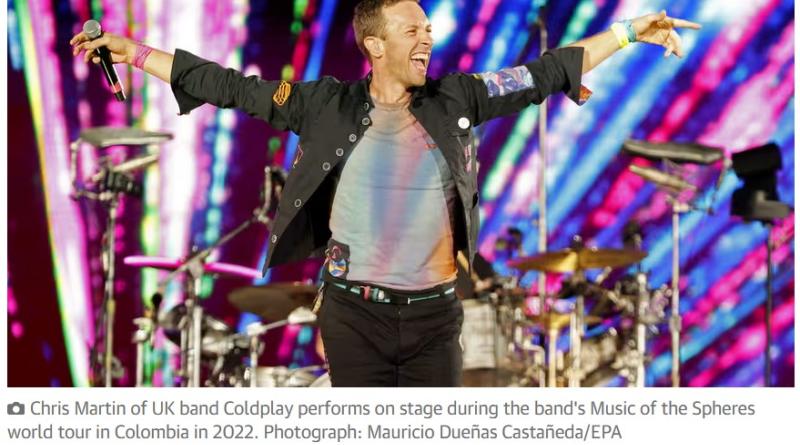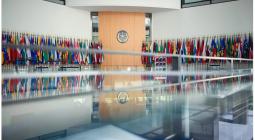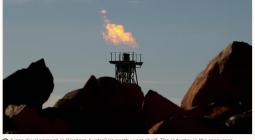It was all eco: Coldplay beats emissions target for world tour – via kinetic dancefloors and trains

Coldplay has announced that they have reduced their touring carbon footprint by 59% compared with their previous world tour – via some creative methods that include kinetic dancefloors that allow dancing fans to generate electricity, recyclable LED wristbands and the band travelling by train.
On Monday the British band announced that they were “happy to report that direct CO2e emissions from the first two years of this tour are 59% less than our previous stadium tour (2016-17), on a show-by-show comparison”.
In 2021 the band first announced a 12-point plan to lower emissions while touring, two years after frontman Chris Martin vowed to never tour again unless it was done sustainably and with a “positive impact”.
The band’s pledge for the Music of the Spheres world tour, which began in 2022, was to reduce their carbon emissions from show production, freight, band and crew travel by “at least 50%”.
Two years later, the band say they have surpassed that figure – with the help of their fans.
“We’d like to thank everyone who’s come to a show and helped charge the show batteries on the power bikes and kinetic dancefloors,” they said in a statement on their website.
“Everyone who’s arrived by foot, bike, ride share or public transport; everyone who’s come with refillable water bottles or returned their LED wristband for recycling; and everyone who’s bought a ticket, which means you’ve already planted one of seven million trees so far.
“As a band, and as an industry, we’re a long way from where we need to be on this. But we’re grateful for everyone’s help so far, and we salute everyone who’s making efforts to push things in the right direction.”
Coldplay’s shows have featured kinectic dancefloors that generate electricity through the audience jumping up and down on customised tiles.
During the show fans are also encouraged to hop on power bikes, which, along with solar installations and the dancefloors, charge smaller stage areas during concerts, as well as phone, laptop and tool-charging stations for the crew.
Coldplay’s data was collated by sustainability business Hope Solutions and their claims verified by Massachusetts Institute of Technology. MIT Prof John E Fernandez praised the band for “leading by example … to move the entire music industry toward true and humane sustainability”.
“With each subsequent year of their tour … Coldplay is modelling a trajectory toward a low carbon, biodiverse and equitable future,” Fernandez said.
Last July, an interim report suggested the band had fallen just short of their aim, achieving a 47% reduction in carbon emissions. But the new figures released by the band suggests the tour has become more efficient as it goes on.
The band claims that “72% of all tour waste has been diverted from landfill and sent for reuse, recycling and composting”, up from 66% in 2023.
Eighteen shows were powered entirely by a tourable battery system, made from recycled BMW batteries.
Two solar-powered “ocean cleanup river interceptors” have also been paid for during the tour.
For every ticket sold – 7 million so far – a tree has been planted through the global reforestation nonprofit One Tree Planted.
Live touring is a carbon-intensive business, particularly for world tours where venues are often thousands of kilometres apart. Artists such as Taylor Swift have been criticised for excessive use of private jets for touring and personal use.
While Coldplay rely on air travel for most of their shows, Martin has pledged to take public transport to gigs where possible. He arrived for the band’s shows in Cardiff by train.





